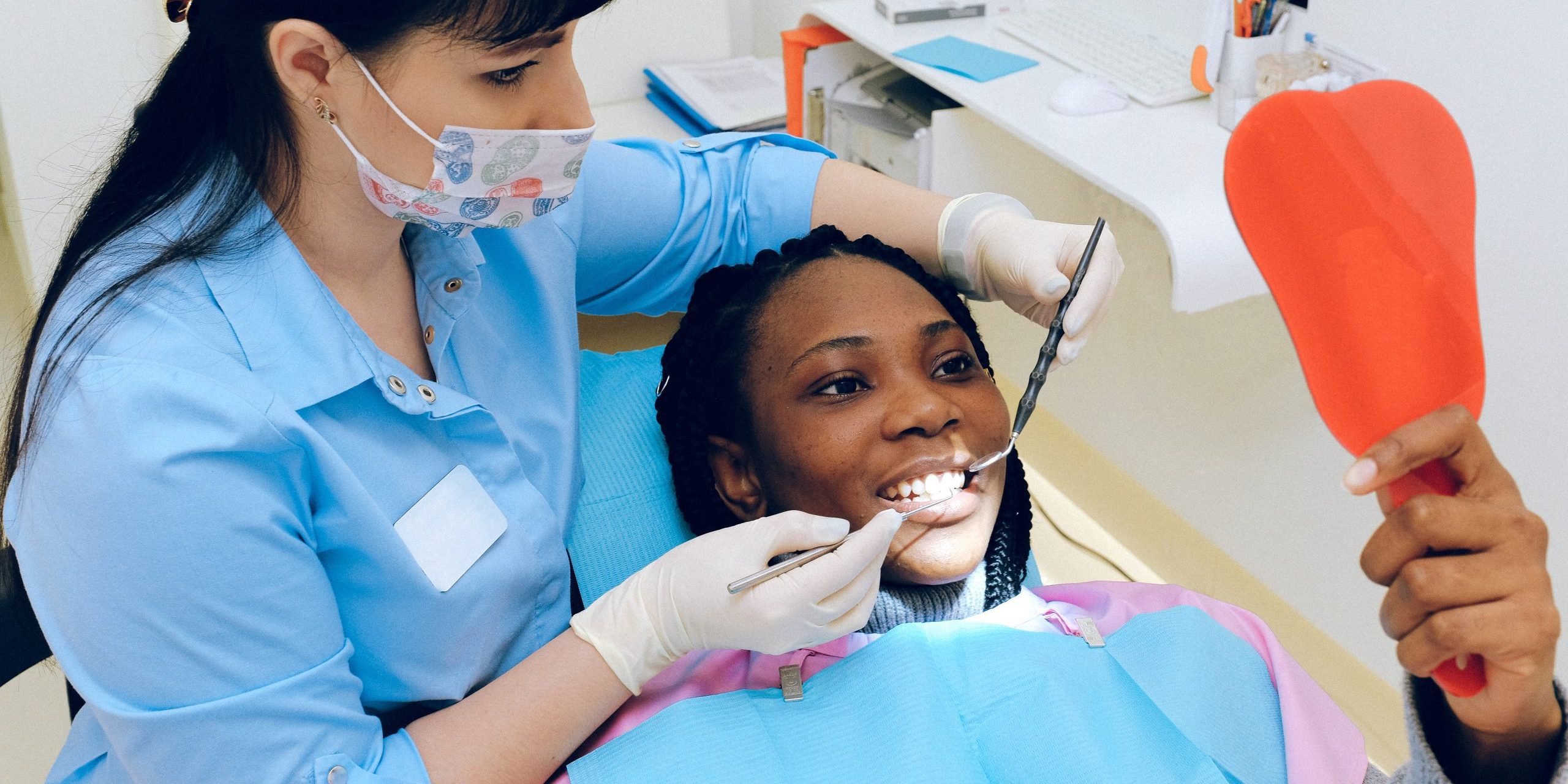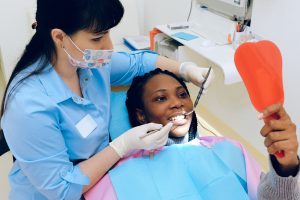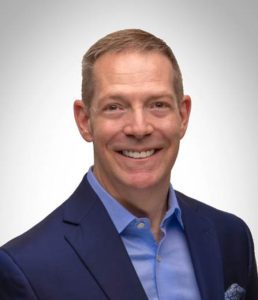By: Bennett Napier, CAE
For most people, at some point in our lives we will use the services of a licensed dentist. This blog is intended to help you determine the right dentist for your needs.
It’s important for patients to know the alphabet soup of designations and specialties within dentistry.
The DDS (Doctor of Dental Surgery) and DMD (Doctor of Dental Medicine) are both dental degrees. They are awarded upon graduation from a dental school to become a General Dentist. The majority of dental schools award the DDS degree; however, some award a DMD degree. The education and degrees are by and large, the same.
After graduation, dentists have to have a license to practice in the state(s) they wish to work in. Each state has different requirements for licensure and continuing education.
See each state’s requirements at:
https://www.ada.org/en/education-careers/licensure/licensure-dental-students/state-dental-boards
Dentists work with a team of people within their practice such as, dental assistants, dental hygienists, practice and/or office managers and administrative staff to help deliver oral health care. These allied professionals generally work alongside the dentist within the dental practice setting and are in direct contact with the patient (under the supervision of the dentist).
Most dentists also utilize the professional skills and knowledge of dental laboratory technicians that are employed by commercial dental laboratories to deliver restorative and cosmetic dental work. Dental laboratories fulfill prescriptions for dental devices such as crowns, bridges, implants, veneers, dentures, aligners, night guards, sleep apnea and orthodontic appliances.
It is common in today’s dental treatment planning, for a patient to interact with a dental laboratory technician, for services such as “custom shade taking” where a technician works to match the desired tooth color of a new restoration to existing teeth, or to the aesthetic desires of the patient. Patients may also interact with a dental laboratory technician when a case may be more complex that requires a team approach where the general dentist, a dental surgeon and the technician work in concert with each other to perform full mouth reconstructions or smile design plans.
To gain a better understanding of the role of dental laboratory technicians visit www.nbccert.org and https://nadl.org/certification/dental-lab-career.cfm. For more information on questions to ask your dentist regarding the dental laboratory and dental technician they work with, visit https://dentallabs.org/who-makes-your-crown/.
In dentistry, there are nine specialties recognized by the American Dental Association. In this blog, we will cover just a few of the different areas of discipline.
General Dentist
A General Dentist is in effect a family dentist and provides patient’s oral health care on a regular basis. This is the most common type of dentist and the majority of their work revolves around important preventative oral care. This includes regular dental cleanings, dental X-rays, and educating patients about proper at-home oral care. General Dentists are also responsible for restorative oral care. They are also monitoring the health of your mouth, neck, and head so ensure there are no issues.
Here are three good resources to find a General Dentist:
https://findadentist.ada.org/ American Dental Association
https://www.agd.org/ Academy of General Dentistry
https://www.aacd.com/profiles American Academy of Cosmetic Dentistry
Orthodontist
You may know Orthodontists as the ones who install braces, but their care extends much farther beyond that. Orthodontists focus on righting misaligned teeth, jaw bones, and other supporting facial structures for both cosmetic and functional reasons.
To find an Orthodontist visit:
https://www.aaoinfo.org/ American Academy of Orthodontists
Oral and Maxillofacial Surgeon
Oral and Maxillofacial Surgeons focus on the hard and soft tissues found in and around the mouth. These tissues include the gums, cheeks, lips, hard palate, soft palate, tongue, and facial tissues. Surgeons receive additional training after dental school and thus perform more complex surgeries than other dental professionals.
To find an Oral and Maxillofacial Surgeon visit: https://www.aaoms.org/
Prosthodontist
Prosthodontists are responsible for providing oral prostheses that replace damaged, decayed, or missing teeth. Restorations can include crowns, bridges, dentures, dental implants, and veneers.
To find a Prosthodontist visit:
http://www.prostho.org/ American Prosthodontic Society
https://www.prosthodontics.org/ American College of Prosthodontists
It is important that the patient take an active role in their oral health care to ensure the best possible outcomes.
About the Author
Bennett Napier, MS, CAE, is a Certified Association Executive and serves as Chief Staff Executive of the National Association of Dental Laboratories. Napier has been involved in the dental industry since 1994 having served as a Chief Staff Executive for state and national organizations in both dental hygiene and the dental laboratory industry. Prior to his career in association management, he worked in Washington DC, as a congressional assistant and policy analyst for a foundation.










The excellent article provides the right information about Dentists in all fields. Thank you for such great knowledge
Excellent blog post! This is very helpful to people looking for the right dentist for them.
When it comes to finding the right dentist, there are a few things you need to take into consideration. First and foremost, you need to make sure that the dentist is licensed and accredited. Secondly, you need to find out what type of services the dentist provides. Thirdly, you need to check the dentist’s office hours and location. Fourthly, you should ask around for referrals.
When it comes to finding the right dentist, there are a few things you should keep in mind. First, you want to find someone who is experienced and qualified. Second, you want to find someone who is gentle and understanding. Third, you want a dentist who is convenient for you. Fourth, you want to find a dentist who accepts your insurance. And fifth, you want to find a dentist who offers payment plans.
It’s very nice to see. I would like to comment your post. You did a great work here. I am happy to share this post to my friends. Thanks a lot and have a great day.
Well -explained info
Hello Author. It was interesting to point out that each USA state has different requirements for licensure of the DDS (Doctor of Dental Surgery) and DMD (Doctor of Dental Medicine) dental degrees.
Finding a dentist in Adelaide can be challenging, but this guide simplifies the process. Ensure the dentist is licensed and offers the services you need. Check their office hours, location, and patient reviews. Personal referrals are also valuable. This approach will help you select the right dental care professional.
Finding the right dentist is crucial for your oral health. Start by understanding dental degrees: DDS (Doctor of Dental Surgery) and DMD (Doctor of Dental Medicine) are equivalent, awarded upon graduation from dental school. Ensure your dentist is licensed in your state. Dentists work with a team of dental assistants, hygienists, and administrative staff, often collaborating with dental lab technicians for restorative work. Choose a dentist who communicates well and meets your specific needs.
Choosing the right dentist is crucial for maintaining optimal oral health. Understanding different dental degrees like DDS and DMD, along with specialties such as orthodontics or oral surgery, helps patients make informed decisions. Always check for licensure, experience, and the dentist’s team, including dental lab technicians, for comprehensive care.
This is a helpful guide for finding the right dentist! Understanding the various dental degrees, specializations, and team roles within a practice can really help patients make informed decisions. It’s also great to know the importance of dental laboratory technicians in ensuring quality cosmetic and restorative treatments.